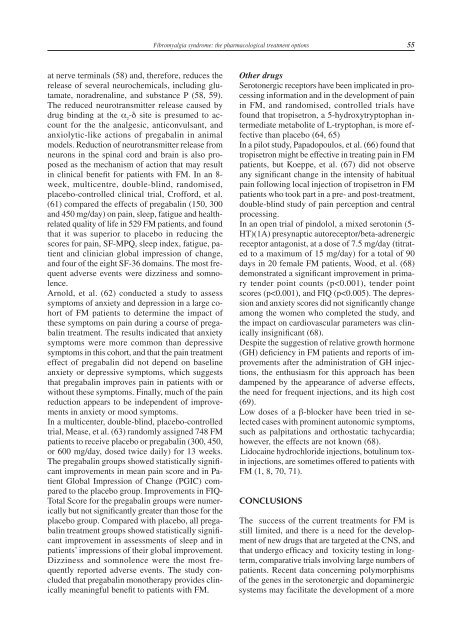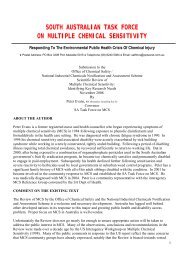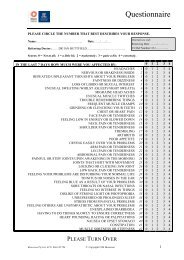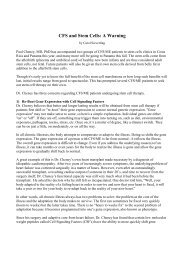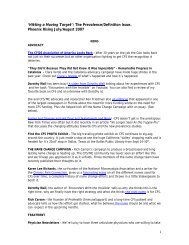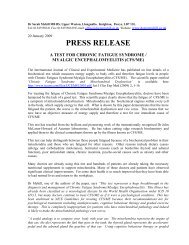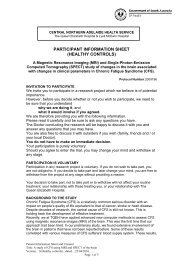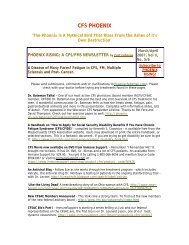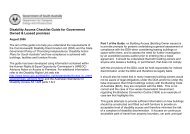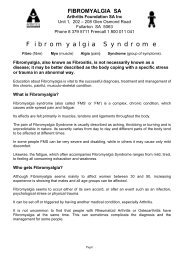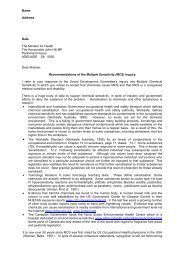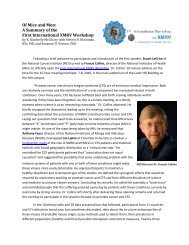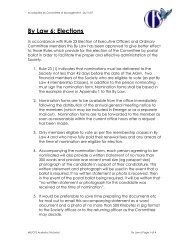54 P. Sarzi-Puttini et al.from 1966 to 2003 and did not consider new antidepressantssuch as SNRIs that are less effectivethan TCAs but remarkably more tolerated, particularlyin long-term treatment (42).Antidepressants that act on both NE and 5HT, i.e.,SNRIs (Serotonergic and Noradrenergic ReuptakeInhibitors), are venlafaxine, duloxetine and milnacipran(milnacipran is not marketed in Italy).Only a few controlled studies are available to date;these are summarized in Table I (43-46). All ofthese controlled studies demonstrated a significantsuperiority of the SNRI over placebo, and reportedfew and mild side effects (more frequent nausea,dry mouth and constipation in the first twoweeks of treatment) (47).Cyclobenzaprine, a tricyclic muscle relaxant, hasalso proven to be moderately effective in FM patientsat a dose of 10-40 mg/day (48). This has recentlybeen confirmed by a meta-analysis of fiverandomised, placebo-controlled trials (49), whichshowed that patients treated with cyclobenzaprinewere approximately three times as likely to reportsymptom improvement, but there was a highdropout rate and the duration of the studies wasshort (49).In our experience treating cancer pain with antidepressants,we have found that the impact of antidepressantson emotion and cognition is quite interesting:after a month of treatment, especiallywhen brief psychotherapy is also included, patientswho have pain as well as maladaptive coping styles(such as despair or hopelessness) begin to adoptpositive coping styles (such as fighting spirit). Thischange is obtained by improving mood and reshapingbeliefs about pain, both of which are extremelyimportant in malignant pain diseases (50).A final consideration involves the placebo effect inpain treatment.In a medical model placebo is manly considered aninert substance, and at present, it is well knownthat the placebo effect on pain is mediated by anopioid mechanism (51).In clinical practice, however, we consider that aplacebo effect is also an adjunct response to an activedrug: the individual expectation of a positiveresponse will increase the pharmacological actionof the drug, while a negative expectation will reducethe effectiveness of the therapy (nocebo effect).The placebo effect is highly related to the relationshipbetween patient and physician (52), a relationshipthat is also important in affecting pharmacologicaltreatments as well.Anticonvulsants/antiepileptic drugsAntiepileptic drugs (i.e., gabapentin and pregabalin)act at a number of sites that may be relevantto pain. The precise mechanism of their analgesiceffect remains unclear, but it is thought that theylimit neuronal excitation and enhance inhibition(53). The relevant sites of action include voltagegatedion channels (i.e., sodium and calcium channels),ligand-gated ion channels, excitatory receptorsfor glutamate and Nmethyl-D-aspartate, theinhibitory receptors for gamma-aminobutyric acid(GABA) and glycine (54).In preclinical pain models, gabapentin is a structuralanalogue of the neurotransmitter GABA; it exertsrobust analgesic and anti-allodynic effects insyndromes that are secondary to sensitization ofpain responses but has minimal effects in modelsof acute, transient pain (55). Taylor, et al. (56) suggestedthat gabapentin did not appear to reduceacute pain from injury, but appeared to be effectivein reducing abnormal hypersensitivity (allodyniaand hyperalgesia) induced by inflammatory responsesor nerve injury. The antinociceptive effectsof gabapentin are hypothesized to be mediated bymodulation of calcium channels via 2binding, modulationof transmission of GABA, and possibly otheradditional unidentified mechanisms.Arnold, et al. (57) conducted a 12-week, randomized,double-blind study that was designed to comparegabapentin (1,200-2,400 mg/day; n=75 patients)versus placebo (n=75 patients) for efficacyand safety in treating pain associated with FM. Patientswho were treated with gabapentin displayedsignificantly greater improvements in the BriefPain Inventory (BPI) average pain interferencescore, the Fibromyalgia Impact Questionnaire(FIQ) total score, the Clinical Global Impression ofSeverity, the Patient Global Impression of Improvement,the Medical Outcomes Study (MOS)Sleep Problems Index, and the MOS Short Form 36vitality score; but they did not show improvementsin the mean tender point pain threshold or theMontgomery Asberg Depression Rating Scale.Gabapentin was generally well tolerated by theseFM patients.Pregabalin is an α 2-δ ligand that has analgesic, anxiolytic-like,and anticonvulsant activity in animalmodels. Biochemical studies identified α 2-δ (type1) as the primary binding site for both pregabalinand the related compound, gabapentin (57). Alpha2-delta is an auxiliary protein associated withvoltage-gated calcium channels. Potent binding ofpregabalin at the α 2-δ site reduces calcium influx
Fibromyalgia syndrome: the pharmacological treatment options 55at nerve terminals (58) and, therefore, reduces therelease of several neurochemicals, including glutamate,noradrenaline, and substance P (58, 59).The reduced neurotransmitter release caused bydrug binding at the α 2-δ site is presumed to accountfor the the analgesic, anticonvulsant, andanxiolytic-like actions of pregabalin in animalmodels. Reduction of neurotransmitter release fromneurons in the spinal cord and brain is also proposedas the mechanism of action that may resultin clinical benefit for patients with FM. In an 8-week, multicentre, double-blind, randomised,placebo-controlled clinical trial, Crofford, et al.(61) compared the effects of pregabalin (150, 300and 450 mg/day) on pain, sleep, fatigue and healthrelatedquality of life in 529 FM patients, and foundthat it was superior to placebo in reducing thescores for pain, SF-MPQ, sleep index, fatigue, patientand clinician global impression of change,and four of the eight SF-36 domains. The most frequentadverse events were dizziness and somnolence.Arnold, et al. (62) conducted a study to assesssymptoms of anxiety and depression in a large cohortof FM patients to determine the impact ofthese symptoms on pain during a course of pregabalintreatment. The results indicated that anxietysymptoms were more common than depressivesymptoms in this cohort, and that the pain treatmenteffect of pregabalin did not depend on baselineanxiety or depressive symptoms, which suggeststhat pregabalin improves pain in patients with orwithout these symptoms. Finally, much of the painreduction appears to be independent of improvementsin anxiety or mood symptoms.In a multicenter, double-blind, placebo-controlledtrial, Mease, et al. (63) randomly assigned 748 FMpatients to receive placebo or pregabalin (300, 450,or 600 mg/day, dosed twice daily) for 13 weeks.The pregabalin groups showed statistically significantimprovements in mean pain score and in PatientGlobal Impression of Change (PGIC) comparedto the placebo group. Improvements in FIQ-Total Score for the pregabalin groups were numericallybut not significantly greater than those for theplacebo group. Compared with placebo, all pregabalintreatment groups showed statistically significantimprovement in assessments of sleep and inpatients’ impressions of their global improvement.Dizziness and somnolence were the most frequentlyreported adverse events. The study concludedthat pregabalin monotherapy provides clinicallymeaningful benefit to patients with FM.Other drugsSerotonergic receptors have been implicated in processinginformation and in the development of painin FM, and randomised, controlled trials havefound that tropisetron, a 5-hydroxytryptophan intermediatemetabolite of L-tryptophan, is more effectivethan placebo (64, 65)In a pilot study, Papadopoulos, et al. (66) found thattropisetron might be effective in treating pain in FMpatients, but Koeppe, et al. (67) did not observeany significant change in the intensity of habitualpain following local injection of tropisetron in FMpatients who took part in a pre- and post-treatment,double-blind study of pain perception and centralprocessing.In an open trial of pindolol, a mixed serotonin (5-HT)(1A) presynaptic autoreceptor/beta-adrenergicreceptor antagonist, at a dose of 7.5 mg/day (titratedto a maximum of 15 mg/day) for a total of 90days in 20 female FM patients, Wood, et al. (68)demonstrated a significant improvement in primarytender point counts (p
- Page 2 and 3:
2 P. Sarzi-Puttini et al.The meetin
- Page 4 and 5: 4 M. Cazzola et al.(2). In the earl
- Page 6 and 7: 6 M. Cazzola et al.enough to meet F
- Page 8 and 9: 8 M. Cazzola et al.Table I - Charac
- Page 10 and 11: 10 M. Cazzola et al.Table IV - Cond
- Page 12 and 13: 12 M. Cazzola et al.teria, three su
- Page 14 and 15: 14 M. Cazzola et al.tients with a n
- Page 16 and 17: 16 G. Cassisi et al.The cardinal fe
- Page 18 and 19: 18 G. Cassisi et al.StiffnessIn FM
- Page 20 and 21: 20 G. Cassisi et al.Autonomic and n
- Page 22 and 23: 22 G. Cassisi et al.Associated symp
- Page 24 and 25: 24 G. Cassisi et al.46. Coleman RM,
- Page 26 and 27: 26 S. Stisi et al.sensitization,”
- Page 28 and 29: 28 S. Stisi et al.Sum oflife-events
- Page 30 and 31: 30 S. Stisi et al.trols, they prese
- Page 32 and 33: 32 S. Stisi et al.stress, obtained,
- Page 34 and 35: 34 S. Stisi et al.50. Harris RE, Cl
- Page 36 and 37: ORIGINAL ARTICLEReumatismo, 2008; 6
- Page 38 and 39: 38 F. Atzeni et al.lalanine (17), a
- Page 40 and 41: 40 F. Atzeni et al.clearer and it m
- Page 42 and 43: 42 F. Atzeni et al.healthy control
- Page 44 and 45: 44 F. Atzeni et al.and/or verbal (e
- Page 46 and 47: 46 F. Atzeni et al.for study purpos
- Page 48 and 49: 48 F. Atzeni et al.mimics of fibrom
- Page 50 and 51: ORIGINAL ARTICLEReumatismo, 2008; 6
- Page 52 and 53: 52 P. Sarzi-Puttini et al.A larger
- Page 56 and 57: 56 P. Sarzi-Puttini et al.rational,
- Page 58 and 59: 58 P. Sarzi-Puttini et al.49. Toffe
- Page 60 and 61: 60 R. Casale et al.cal exercise and
- Page 62 and 63: 62 R. Casale et al.definition of
- Page 64 and 65: 64 R. Casale et al.are more or less
- Page 66 and 67: 66 R. Casale et al.trol associated
- Page 68 and 69: 68 R. Casale et al.32. Lewit K. The
- Page 70 and 71: ORIGINAL ARTICLEReumatismo, 2008; 6
- Page 72 and 73: 72 L. Altomonte et al.In a clinical
- Page 74 and 75: 74 L. Altomonte et al.Table II - We
- Page 76 and 77: 76 L. Altomonte et al.treatments de


